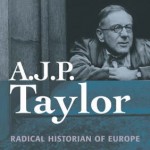 It has been particularly pleasing to me to see that the BBC have made available some of their lectures from the 1970s by the legendary radical historian AJP Taylor. I warmly remember my history teacher showing us his half hour programme where, for a few weeks, he convinced the world that the First World War started because of the Russian railway timetable. “That’s how you put an argument together boys” to quote Mr Sneddon…
It has been particularly pleasing to me to see that the BBC have made available some of their lectures from the 1970s by the legendary radical historian AJP Taylor. I warmly remember my history teacher showing us his half hour programme where, for a few weeks, he convinced the world that the First World War started because of the Russian railway timetable. “That’s how you put an argument together boys” to quote Mr Sneddon…
His lectures are excellent things for an A Level student to consider, not least because they are the very antithesis of much of what is produced today. Compare for example at this trailer for Sky’s “The British” with Taylor’s discussion of Europe in 1940 here, and you can draw your own conclusions about style V substance. Moreover, the fact remains that Taylor’s lectures regularly drew in over 10 million viewers on Sunday nights. As Dhruti Shah comments, there were not special effects, rather “he drew in the audiences with his strong opinions and unscripted lecture.” A BBC article on Taylor can be found here.
Taylor is sometimes accused of putting clever arguments before solid history. To that effect you might like to read this review of a recent biography of Taylor. It states,“while a few of his books – especially The Struggle for Mastery in Europe (1954), English History, 1914-45 (1965) and the provocative Origins of the Second World War (1961) – are still read, none is considered entirely reliable”. Perhaps, but that misses the point. All three are utterly extraordinary, and I will happily lend you my copy for a summer read if you want to come into contact with a touch of genius.
Finally, and above all please do take the chance to watch him at his best. Here he discusses Churchill’s reputation.
Mr Kydd.




It was interesting to watch ‘A.J.P. Taylor discusses Europe in the summer of 1940’ and see ‘how’ he delivers his view so concisely and gets his opinions across to the viewer.
Very interesting ideas about history in general. First, it’s intriguing to think about the parralels between two different cases (like the Norman Invasion of England and D-Day). And second, to think about individuals, rather than ideas or the masses, having the ability to change the course of history, for instance Churchill….
sometimes, I even bore myself.
Just a note to say thanks for reading the article. I’m glad you liked it.